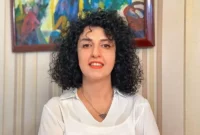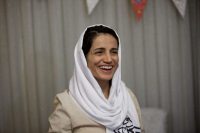
Les gouvernements occidentaux ne devraient pas remettre à plus tard la démocratie et les droits de l’homme en Iran
Je tiens à exprimer ma gratitude envers les honorables membres du comité Nobel de la Paix pour avoir attribué le prestigieux prix Nobel de la paix au magnifique mouvement « Femme, Vie, Liberté » et à une femme emprisonnée, défenseure des droits de l’homme et de la démocratie. Je suis reconnaissante pour votre soutien significatif et déterminé.
Je suis convaincue que l’impact indéniable du prix Nobel de la paix sur la puissante mobilisation des Iraniens pour la paix, la liberté et la démocratie sera largement supérieur à celui de ma lutte et de ma résistance personnelles. C’est une source d’espoir et d’inspiration pour moi.… Seguir leyendo »













